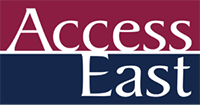Who We Are
In Brief:
Access East Medicaid Care Management is comprised of three care-management teams providing coordinated, physician-driven, cost-effective care to roughly 100,000 Medicaid enrollees across 34 eastern North Carolina counties through a network of patient-centered medical homes ...
We are, in essence, a relatively small organization doing a very big job across a very big area.
The Bigger Picture:
Access East Medicaid Care Management is the largest service line in the not-for-profit Access East family, and home to one of the most devoted groups of nurse care managers, social workers, community coordinators, pharmacists, and support staff you’ll find anywhere.
We are proudly NCQA-accredited for case management.
Our three care-management teams coordinate care for roughly 100,000 North Carolina Medicaid enrollees across an area that stretches to the west from the base of the piedmont on out to the coast, and from the Virginia border to the north down to the South Carolina line. In total, Access East works with patients and medical practices across 34 Eastern North Carolina (ENC) counties, most with large low-income populations and long-standing issues with access to care.
We follow a team-based medical home approach to care, working in close collaboration with regional primary-care providers, hospitals, health and social services departments, and other community-based organizations to deliver comprehensive, continuous, targeted care-management services, We have a proven track record not only in improving quality of care and health-outcomes, but also in managing resources efficiently, and ultimately holding down costs.
In practical terms, our work includes everything from hospital visits with patients to begin their transitions home, joint visits with physicians in medical practices, video visits, follow-up phone calls, education efforts tailored to patients’ own circumstances, medication management, goal setting and countless other support services.
Sometimes, our care-coordination can even be as simple as making sure a patient has the means of getting to a scheduled medical appointment, not only keeping that patient on a path to health-improvement, but often curtailing the future need for a costly emergency-room/ED visit, or an even costlier hospital admission.
